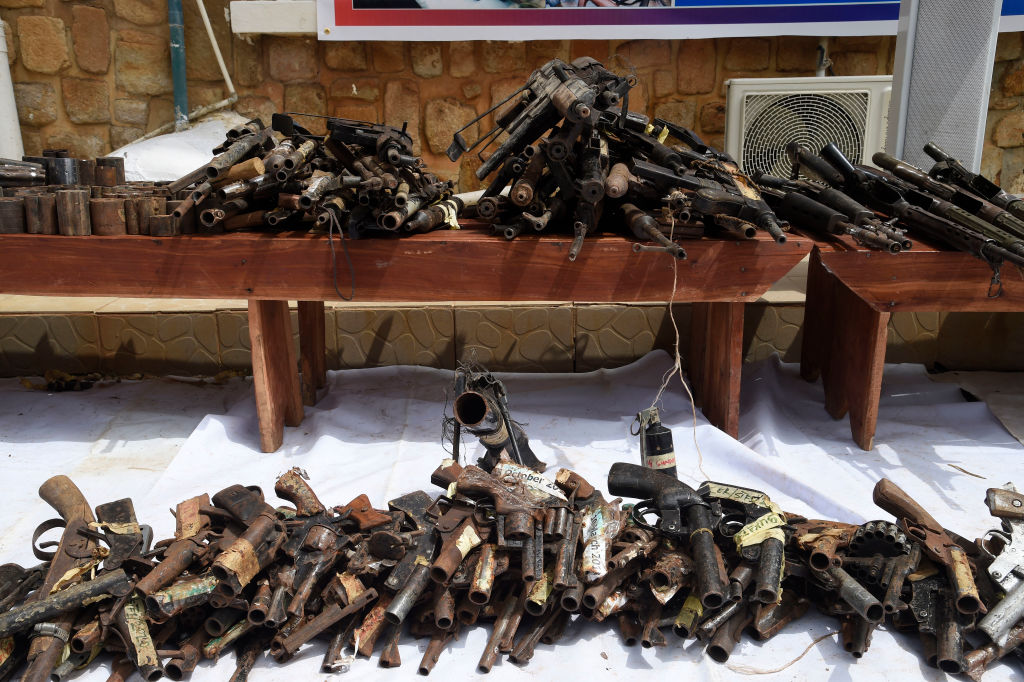ADF STAFF
Soldiers with the Multinational Joint Task Force (MNJTF) in early May killed several terrorists and recovered a cache of weapons during an operation near Lake Chad in northeast Nigeria.
The operation was launched a week after members of Boko Haram and the Islamic State West Africa Province (ISWAP) attacked the task force’s troops in a nearby village, the MNJTF said in a statement.
On May 14, ISWAP claimed responsibility for a deadly attack on MNJTF forces that also was near Lake Chad in northeast Nigeria. That attack killed three MNJTF Soldiers, and an unknown number of terrorists was killed in the MNJTF’s counterattack.
The battles illustrate why Boss Mustapha, Nigeria’s secretary to the Government of the Federation, said he believes that small arms and light weapons (SALW) in the Lake Chad Basin are “slowly becoming weapons of mass destruction.”
Mustapha made the comment during a two-day meeting in March to discuss curbing the flow of SALW in the region. Representatives from Cameroon, Chad and Niger also attended. The SALW to which Mustapha referred typically are obtained illegally.
“The proliferation of small arms in the Lake Chad Basin is a major security concern that has far-reaching consequences for the region,” Mustapha said in a report by Nigerian website newsdiaryonline.com.
“It has contributed to the escalation of conflict and violence and has impeded the economic and social development of the countries in the region,” Mustapha added. “Their widespread availability has caused tremendous harm to communities and individuals, especially women and children.”
Mustapha called for cooperation in regional efforts to confront the issue and to develop and implement agreements on small arms control. Cameroon, Chad, Niger and Nigeria are party to a number of regional and international arms control instruments.
“We must put an end to the senseless and mindless violence of Boko Haram and other violence mongers that are widespread in the region,” Mustapha said.
Boko Haram and ISWAP have bases in the forests and small islands around the basin. The flow of illegally trafficked and smuggled arms is “one of the primary conflict drivers” in the region, according to a report by the United Nations Office for Disarmament Affairs (UNODA).
ISWAP’s strategy shift from large-scale attacks to the increasing use of SALW in Nigeria was in response to the strengthening of the Nigerian Air Force, according to a 2022 study by UNODA, the United Nations Department of Peace Operations and the Lake Chad Basin Commission. ISWAP has turned to smaller operations that often include motorbikes, roadblocks or ambushes with fighters armed with SALW, the study showed.
In 2022, MNJTF operations in the Lake Chad islands resulted in the recovery of significant amounts of weapons, including artillery launchers, and the destruction of several IED factories.
“Decisive Action” Needed
Boko Haram is intent on acquiring ammunition for small arms. Therefore, strengthened control and management of ammunition, and initiatives to counter ammunition trafficking are critical, according to the MNJTF.
During the two-day meeting in May, Nigeria’s national security advisor, retired Maj.-Gen. Babagana Mongonu, implored each country to “take decisive action” against the proliferation of SALW. Nigeria, for example, established a National Centre for the Control of SALW and signed the Economic Community of West African States Convention on SALW.
“However, we recognize that this is not a problem that any one country can solve alone,” Mongonu said in the newsdiaryonline.com report. “We must work together as a region to address the root causes of this problem including poverty, underdevelopment and poor governance. We must also strengthen our border control measures to prevent the illicit flow of small arms and light weapons across our borders.”

